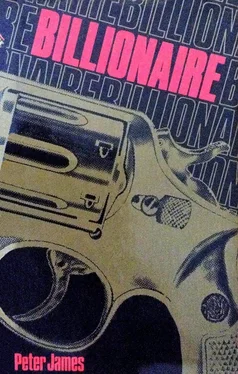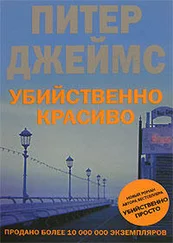‘I see.’
‘I would be very interested, Mr Rocq, in a brief tour around your offices — I think it would be very helpful.’
‘Certainly. It will have to be quick, as I have an urgent appointment at 12.30.’
‘I understand,’ said Baenhaker.
The urgent appointment was currently undergoing its final pre-delivery checks in Motortune’s Service bay.
Rocq took Baenhaker around the offices, the computer room, the massive Globalex switchboard, which could plug any one of the 310 telephones in the offices directly into any of Globalex’s offices anywhere else in the world. So massive was the switchboard, and so important was it to Globalex business, that it employed here in London two full-time telephone engineers.
They finally came down into the trading room and Rocq took Baenhaker over to show him his desk and chair, in between Slivitz and Mozer. He pointed out the Reuter Moniter computer terminal, on which he could receive, at the touch of a button, the price of any commodity, stock or share on any market anywhere in the world. But Baenhaker did not take that in. An object on Rocq’s desk had caught his attention, and was holding him riveted: it was the framed photograph of Amanda. His face went white; he looked carefully at it, trying to see if he was mistaken — but he knew he wasn’t. Proof came when he suddenly noticed, amid a pile of letters on the desk, some opened, others not, a bunch of keys attached to a Porsche keyring.
Baenhaker froze, and Rocq’s words poured over the top of him. He felt as though his insides were in tatters, and he was unable to think straight.
‘Would you like to see the London Metal Exchange itself? It will give you a good idea of how the metal trading business actually works, if you see the ring dealing yourself.’
‘Thank you,’ said Baenhaker meekly, following him out, down, across the road and into Plantation House. A few minutes later, they stood looking through the soundproofed window, down onto the actual floor of the London Metal Exchange.
It is a circular room, around the outside of which are numbered telephone cubicles, almost all of them occupied by someone holding two receivers to his head, listening to one and talking to the other, whilst at the same time passing on an endless chain of messages which are shouted at him from one of a couple of young men. In the centre of the room is a circular red leather bench-seat, around which, on this particular day as on any other day, sat a mixture of men and women, mostly in their twenties. Suddenly, a bell rang; they got up and were replaced by a second group of people who took their seats.
‘They deal in five-minute turns in each metal, in two sessions: the first is from 11.45 to 1.30, the second from 3.25 to 5.00. They’ve just been dealing Copper, now they’re starting Tin,’ explained Rocq.
The people, with few exceptions, looked young to Baenhaker. He told Rocq.
‘Dealing in the ring is very high pressure,’ said Rocq. ‘You get burned out very quickly — and you really have to be either young, or quite exceptional, to be able to think and act quickly enough to keep pace. I did it for a while, and I occasionally do a day in there now — but if I went on doing it I would be dead by the time I reached forty.’
A clerk, nonchalantly chewing gum, carried a piece of paper from the ring to one of the kiosks; prominently displayed on his back was a notice of which he was evidently unaware, in spite of the entire rest of the London Metal Exchange’s sniggers. The message read, ‘I’m a burk.’
‘What happens in the evening?’ said Baenhaker. ‘Do your offices close?’
‘They do in London — but we have offices in cities covering all the world’s time zones. So we keep buying and selling for our clients twenty-four hours a day. One of our rivals has the slogan: “Twenty-four carats, twenty-four hours.” We go one better. Our slogan is: “At Globalex, we make you richer while you’re just dreaming about it!” ’
‘I prefer 24 carats 24 hours,’ said Baenhaker.
‘Yes — maybe it is better,’ said Rocq, defensively. ‘But we’ve just taken on a new ad agency, so maybe they’ll come up with something better.’
‘I’m sure they will, Mr Rocq.’
When they parted company, at 12.15, Rocq went straight back to his office and telephoned Eisenbar-Goldschmidt.
‘Good morning,’ he said to the switchboard operator. ‘Can you tell me — do you have an Investment Manager by the name of David Bernstein? You do? Is he about six foot two, with blonde hair? No? About five foot eight with dark hair. I see. No, thank you very much — I’m thinking of the wrong person.’
Rocq was not to know that the switchboard operators at Eisenbar-Goldschmidt were every bit as trained in the art of lying as many of the others who worked there.
Rocq replaced the receiver. So Bernstein was genuine, he thought. He shook his head. Something was bothering him about Bernstein. Bothering him a lot. All the same, he decided, now that he had discovered he was genuine, he could turn out to be a useful client. He buzzed down to Sergeant Major Bantry and asked him to hail a cab; then he dashed for the stairs, not bothering to wait for the lift.
He settled back in the seat of the cab, forgot about Bernstein, and thought about his new Porsche. He would take Amanda out in it tonight. Thinking about her made him feel horny. He reflected; hot summer days always made him feel horny, he decided. He looked forward to seeing her tonight even more than usual.
After Baenhaker parted company with Rocq, he walked back to Lower Thames Street feeling as if he had been hit with a sledge-hammer. He was surprised at the intensity of the hatred he felt for Rocq; it was stronger even than he could ever remember feeling against the Arabs, after his mother and two sisters had been blown to pieces by a terrorist bomb in a Jerusalem vegetable market. He found he could not prevent himself from shaking with rage. He was filled with a desire to go home, get his Walther and go back and blow Rocq’s brains out. All his training in the control of emotions, never to let personal feelings intervene, was of no use. He could not get it out of his mind: he wanted to smash Amanda to pulp and blow Rocq’s brains out.
He reached his office, and began to stab out her home phone number on his push-button phone. Then he stopped. He realized she would be at work; he began to stab out her work number.
‘Garbutt and Garbutt,’ said the receptionist of the Knightsbridge architects.
‘I’d like to speak to—’ he paused, then hung up; he shook his head. There was no point, he knew. He began to attack an unpleasant spot that was festering just above his shirt collar. Then he sat back and thought about his meeting with Rocq. Other than discovering who it was that had pinched Amanda from him, he had achieved very little. He had blown any chances of a quick answer to anything from Rocq. However angry he might have felt with Ephraim, first after his visit to the hospital and then after his phone call, he wanted to stay on the right side of the chief of the Mossad. Ephraim could, he knew, make life very unpleasant indeed for him; equally, he could make it very much better. The information Ephraim had asked for really should not be that difficult, he reasoned; after all, it was a private company, not the vaults of MI5, which held the information.
The offices of Globalex did not operate around the clock, Rocq had told him. All the office staff would have left by eight thirty, and the cleaning staff by nine thirty. He wondered if the doorman he had seen lived on the premises, not that that particularly bothered him.
He forgot about the aches and pains in his body from the accident, and started to think hard:
It was Wednesday today: he had tonight and Thursday night; there was no time to lose. He would go straight in tonight. He began to draw up in his mind the list of things he would need. For the first time in a long time he felt excitement, felt his adrenalin begin to flow. ‘You can do whatever you want to get this information,’ Ephraim had said. ‘Anything at all that you do will have our full support.’ The words were like a drug to him, like a deep snort of cocaine. He began to feel good, very good and very protected; it had been a long time, he reflected, since his Control had given him carte blanche. Far too long.
Читать дальше











![Питер Джеймс - Искушение [litres]](/books/423638/piter-dzhejms-iskushenie-litres-thumb.webp)
![Питер Джеймс - Wish You Were Dead [story]](/books/430350/piter-dzhejms-wish-you-were-dead-story-thumb.webp)